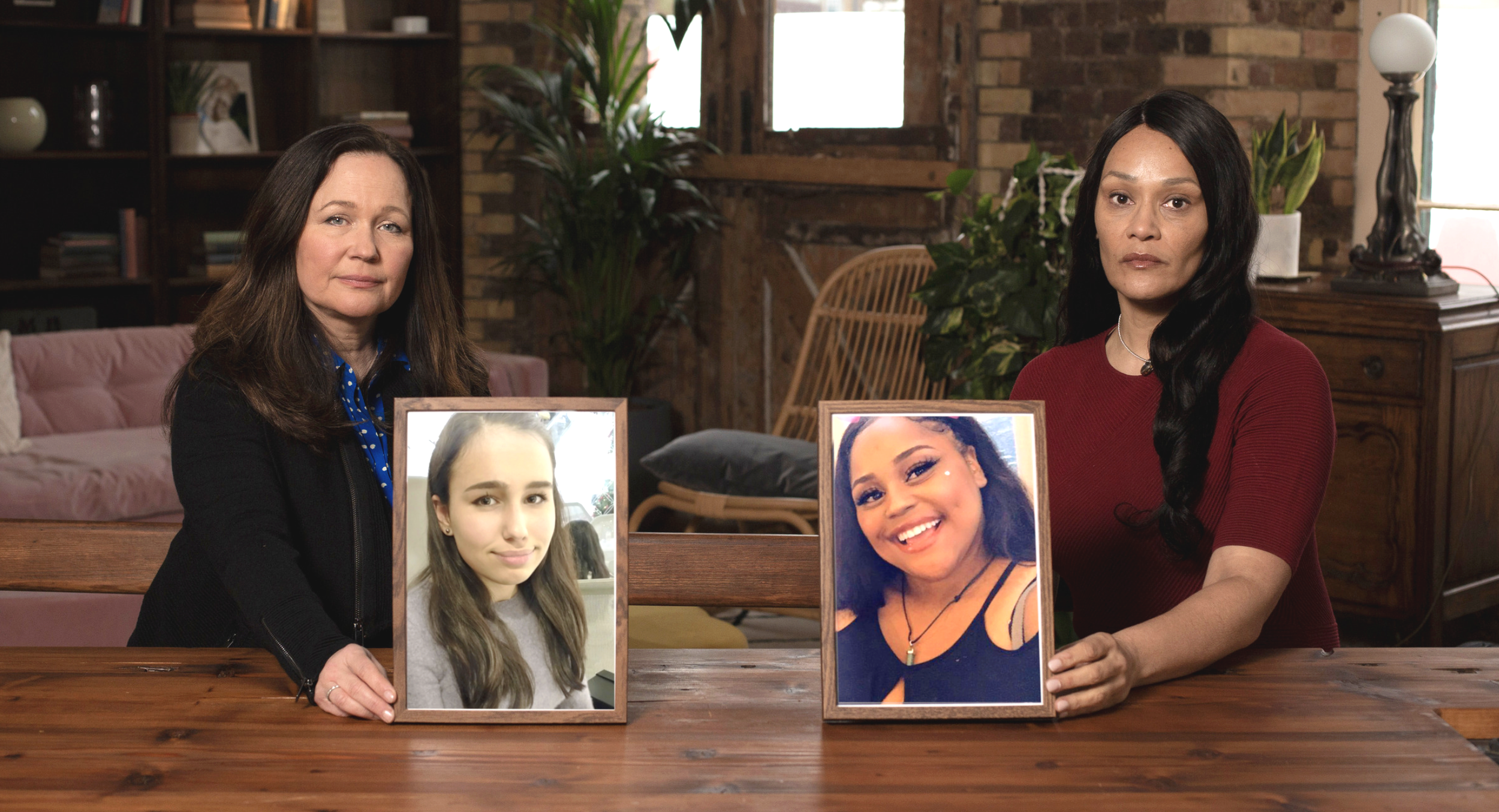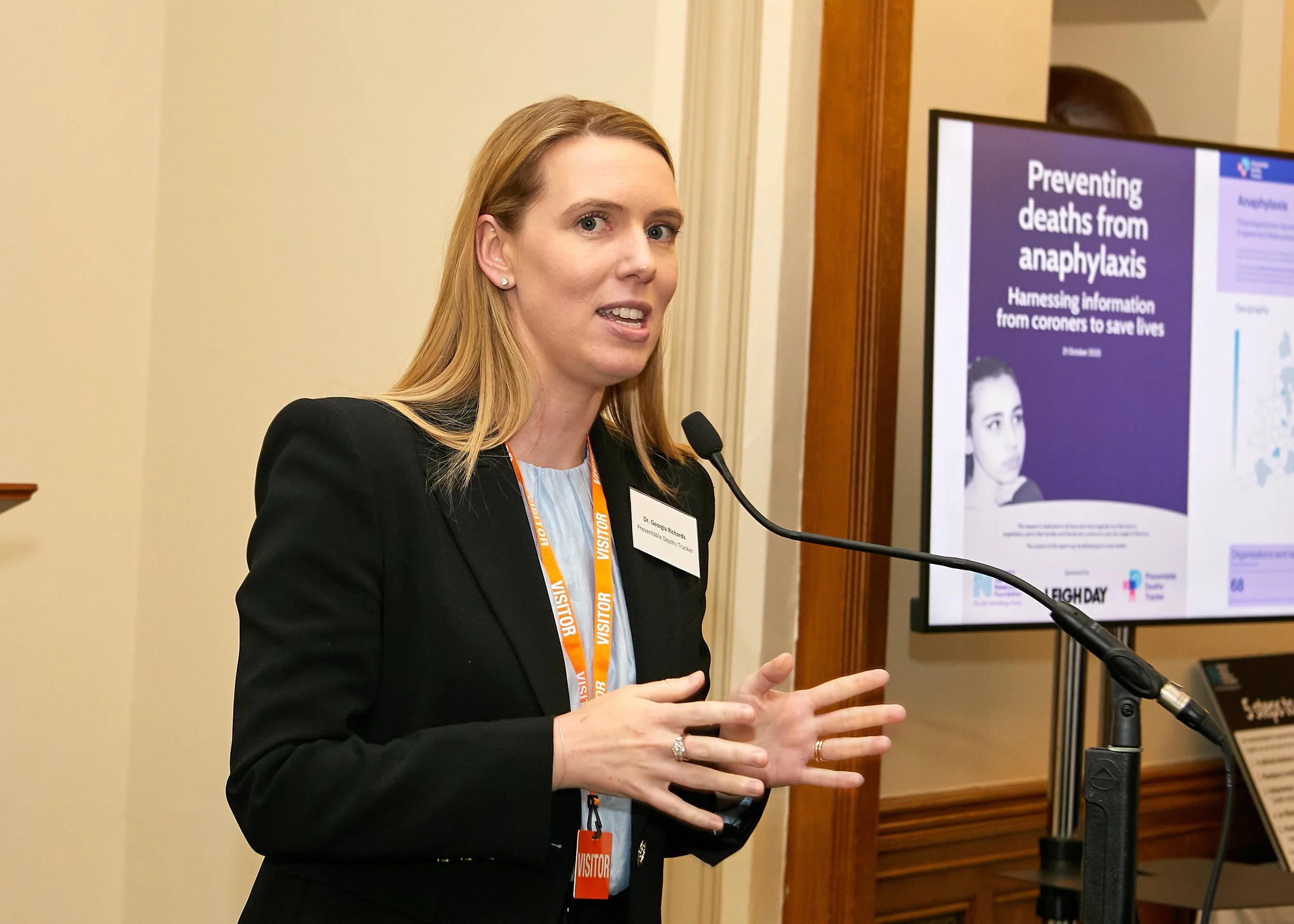Bereaved Families Call for Action to Prevent Future Anaphylaxis Deaths
Bereaved Families Call for Urgent Reform to Prevent Anaphylaxis Deaths
New Report Demands Urgent Reform of the UK Inquest System to Prevent More Lives Being Lost to Anaphylaxis
Families who have lost loved ones to food allergies came together to launch a landmark report exposing critical failings in the UK coronial system, and call for urgent action to prevent future deaths from anaphylaxis.
Anaphylaxis Deaths: The Tip of the Iceberg
The report, carried out in collaboration with The Natasha Allergy Research Foundation, reveals that the lives of people with severe food allergies are being put at risk because the UK is failing to learn lessons from coroners’ investigations. Coroners serve a vital role in society by providing independent, transparent investigations into sudden, unexplained, or unnatural deaths, so that lessons can be learned to prevent future deaths. Yet the new report reveals that while food allergy related deaths by their very nature are sudden and unexpected, not all result in an inquest.
On average, only two Prevention of Future Deaths (PFD) reports involving anaphylaxis are issued each year.
40% of organisations fail to respond to PFD reports within the statutory 56 days.
52% take no action following a report.
No statistics are collected to determine how many deaths are investigated by coroners that involve the most severe allergic reaction, anaphylaxis.
These findings show that the current inquest system is inadequate to prevent repeated tragedies.
Bereaved Families Call for Urgent Reform to Prevent Anaphylaxis Deaths | Photo credit: Zoe Norfolk
Families Demand Change
The report was launched at an event in the House of Commons on 21 October 2025, attended by parents and family members who have lost children to food-related anaphylaxis.
Tanya and Nadim Ednan-Laperouse OBEs, founders of Natasha’s Foundation, lost their daughter Natasha, aged 15, after she suffered a fatal allergic reaction to a baguette that did not list sesame as an ingredient.
“Natasha’s death in 2016 was entirely preventable. To fail to learn from these mistakes is unthinkable. We hope this study shines a light on the need for urgent action so no more parents face this devastating loss.”
- Tanya and Nadim Ednan-Laperouse OBEs
Tanya Ednan-Laperouse OBE and Emma Turay
Other families, including the Duyiles, Turays, Norths and Kings, shared similar stories of preventable loss.
Emma Turay, whose daughter Shanté Turay-Thomas died aged 18 from anaphylaxis to hazelnuts in 2018 said:
“After reading this report, I feel lucky that an inquest was carried out into Shanté’s death and a Prevention of Future Deaths report issued.
“Yet five years on from the inquest, the coroner’s concerns about the lack of a national allergy lead, an Allergy Tsar, to act as a champion for people living with allergies and drive forward change, have still not been acted upon. We need to learn lessons from our mistakes to prevent future deaths.”
Dr. Georgia Richards Presenting
5 Life-Saving Recommendations
The report calls for urgent reforms to the inquest system, including:
A statutory national database of all deaths investigated by coroners.
Mandatory coroner investigations for all anaphylaxis deaths.
Parliamentary oversight to ensure responses to PFD reports are transparent and accountable.
Appointment of an Allergy Tsar, a national allergy champion to drive change.
Mandatory national reporting of all anaphylactic events, including near-fatal reactions.
Dr Georgia Richards, epidemiologist and founder of the Preventable Deaths Tracker, said:
“Coroners repeatedly raise the same concerns, yet nothing is done. Harnessing this information could save lives. Urgent action is needed.”
The Scale of the Problem
Analysis of 32 anaphylaxis-related PFD reports showed:
Children aged 10-17 are most at risk, with nearly a third of deaths occurring in school-aged individuals.
41% of deaths were food-related, all in people already diagnosed with food allergies.
189 concerns were raised by coroners, mostly relating to poor communication, lack of professional training, and absence of national oversight.
Yet hospital admissions for severe food allergies have tripled in the last 20 years.
Michelle Victor, head of the Food Safety Team at Leigh Day, said:
“The coronial system is failing families. The lack of a co-ordinated national system to collect data and act on learnings from fatal anaphylaxis cases needs to change - now.”
Act Now to Save Lives
This report, “Preventing Deaths from Anaphylaxis: harnessing information from coroners to save lives,” is a call to action for Government, health services, and organisations.
Implementing its recommendations could prevent future deaths and create a safer environment for children and adults living with severe food allergies.
Learn more and support Natasha’s Foundation in advocating for safer food allergy policies.
Footer notes: Bereaved families meet for launch of new report in House of Commons demanding action to prevent anaphylaxis deaths. They are holding pictures of loved ones lost to food allergies.
Front row, left to right: Adrian St Hilaire and Chanel Spence and whose daughter Mia Shay St Hilaire died aged 12 from anaphylaxis to a milkshake made in an unwashed blender in 2023, Delyth Raffell, whose daughter Ellen Raffell, 16, died from food-triggered anaphylaxis in 2019, Ciara Baxendale (sister) , Angela (mother), Niamh (sister) of Órla Baxendale, 25, who died from anaphylaxis to peanuts in 2024, Ayeshah Qayyum (mother), Amaani Qayyum (sister), Kay Bhatia (aunt), of Idris Qayyum, 19, who died from anaphylaxis to peanut in Turkey in 2024, Abimbola Duyile (mother), Abigail Jacobs (sister) family of 13-year-old daughter Hannah Jacobs died from anaphylaxis to milk in a Costa drink in 2023.
Middle row on right: Cherone Johnson (friend), of 13-year-old daughter Hannah Jacobs died from anaphylaxis to milk in a Costa drink in 2023.
Back row Left to right: Aicha and Mike King (parents), whose daughter Lily King died aged 18 from anaphylaxis to food in Morocco in 2024, Sophie (sister) and Maxine (mother) of Jess North, aged 20, who died from anaphylaxis to nuts in 2021, Nadim and Tanya Ednan-Laperouse (parents) whose daughter Natasha died aged 15 from anaphylaxis to sesame in 2016, Kerrie Stokes and Craig Grinnell whose daughter Hollie Stokes died aged 17 from anaphylaxis to walnuts in 2022, Emma Turay, whose daughter Shanté Turay-Thomas died aged 18 from anaphylaxis to hazelnuts in 2018.
Photographer: Zoe Norfolk












